非谓语动词-作定语
非谓语动词作定语和宾语补足语总结

非谓语动词作定语和宾语补足语总结非谓语动词是指不带有谓语成分的动词形式,包括动词不定式、动名词和现在分词、过去分词。
在句子中,非谓语动词可以用作定语和宾语补足语,用于修饰名词或补充说明动作的情况。
本文将对非谓语动词作定语和宾语补足语的用法进行总结。
一、非谓语动词作定语非谓语动词作定语时,通常与被修饰词之间存在逻辑上的主动或被动关系。
常见的用法有以下几种:1. 动词不定式作定语动词不定式作定语时,说明所修饰名词的用途、目的、结果等。
常见结构为“名词 + 不定式”,不定式可以是带to的原形,也可以是不带to的原形。
例如:- 他有个完全实现梦想的机会。
- 这个女孩太害羞了,从不和人交流。
2. 动名词作定语动名词作定语时,表示该名词的用途、目的、结果等。
常见结构为“动名词 + 名词”。
例如:- 听力训练是学习英语的重要环节。
- 这本书是关于如何提高写作技巧的。
3. 现在分词作定语现在分词作定语时,表示所修饰名词正在进行的动作或状态。
常见结构为“现在分词 + 名词”。
例如:- 拉着行李箱的女人是我的妈妈。
- 那个躺在床上的男孩是我的弟弟。
4. 过去分词作定语过去分词作定语时,表示所修饰名词已经完成的动作或状态。
常见结构为“过去分词 + 名词”。
例如:- 这本被翻阅过许多次的书籍是我的宝贝。
- 我看过的那部电影非常精彩。
二、非谓语动词作宾语补足语非谓语动词作宾语补足语时,用于补充说明宾语的动作或状态。
常见的用法有以下几种:1. 动词不定式作宾语补足语动词不定式作宾语补足语时,说明宾语完成的动作。
常见的结构为“动词 + 宾语 + 不定式”。
例如:- 我喜欢听音乐。
- 她希望学好英语。
2. 动名词作宾语补足语动名词作宾语补足语时,表示宾语的动作或状态。
常见结构为“动词 + 宾语 + 动名词”。
例如:- 我通常喜欢读书。
- 他不值得你浪费时间。
3. 现在分词作宾语补足语现在分词作宾语补足语时,表示宾语正在进行的动作。
非谓语动词做定语举例

非谓语动词做定语举例一.非谓语动词的概念:指在句子中不充当谓语动词的其他动词。
二.非谓语动词的形式:动词不定式、动名词、分词(现在分词、过去分词)。
三.非谓语动词在句中充当定语(定语:常把用来修饰名词的成分称为定语。
)四:例子分析1.非谓语动词——《不定式》在句子中充当定语。
I have a meeting to attend.我有个会要参加。
(该句的主语为I;have为谓语动词;a meeting为宾语。
to attend为后置定语,用以修饰前面的名词a meeting.说明这个会议是我要参加的那个会议。
)He is the first to get to school.他是第一个到校的。
(该句中的动词不定式to get to school“到达学校”用以修饰其前面的名词the first,作其定语成分,说明“他”是第一个到校的。
)2.非谓语动词——《动名词》在句子中充当定语。
例如:There is a swimming pool.有一个池塘。
(该句中的短语a swimming pool“一个池塘”。
swimming用来修饰名词pool,说明pool“池塘”是用来“游泳的”。
)3.非谓语动词——《现在分词》在句子中充当定语。
例如:Look at the falling leaves.看那落叶。
(该句中的现在分词falling“(正在)落下的”修饰名词leaves“叶子”,说明其叶子的状态是正在掉落。
同学们注意区分现在分词与动动名词的区别,不明白这个知识点的小伙伴可以搜索冉老师历史发文哟。
)There were millions of people watching the opening ceremony live on TV.成千上万的人正在电视上观看开幕式直播。
(该句中的watching为现在分词,用以修饰名词people,说明“人们”正在观看的状态。
opening也为现在分词,用以修饰名词ceremony“开幕式”,说明开幕式是正在举办的,是一种现在进行时。
非谓语动词在句中用作定语

非谓语动词在句中作定语在英语句子中,不定式to do,分词v+ing 和v+ed 以及动名词v+ing 是非谓语动词,除不能作谓语外,其他成份都可担当,其中一个成份就是作定语。
不定式to do在句中作定语置于被修饰名词后,常同该名词构成动宾关系,要是不定式是不及物动词,其后应加上必要的介词。
例:I have something to say. (to say something )I’ll give you a magazine to read.That is a good company to work for.He is a pleasant fellow to work with.Would you bring me a bench to sit on?有些名词常接不定式作定语,如:chance ,time ,reason ,way ,effort ,right (权利), mo vement等,例:You haven’t any reason to leave me.You have no right to do such a thing.He succeeded in his effort to overcome his fatal weakness.He put himself out of the way to help others.We have no time to lose..Thank you for giving me the chance to make the speech.The first ,the last ,the second ,the best 等常与不定式连用作定语。
例:He is always the first to come.She would be the last to agree to our plan.You are the second to ask me that question.I’ll do my poor best to fix it up.当to go ,to spare 作“剩下”讲时可作定语。
非谓语动词作定语课件

表示动作的全过程
详细描述
现在分词作定语时,可以表示动作的全过程或某个阶段的 状态。例如,“the developing country”(发展中国 家)中的“developing”表示这个国家正处于发展的过 程中。
过去分词作定语
总结词
表示被动关系
详细描述
过去分词作定语时,通常表示被修饰的名词与过去分词之 间存在被动关系。例如,“the broken window”(破 碎的窗户)中的“broken”表示窗户已经被打破的状态 。
动名词作定语
动名词可以修饰名词,表 示名词的性质或特征,如 “reading room”(阅 览室)。
分词作定语
分词可以修饰名词,表示 名词的状态或动作,如 “falling leaves”(正在 飘落的叶子)。
02
非谓语动词作定语的 分类
现在分词作定语
总结词
表示正在进行的动作或存在的状态
详细描述
总结词
表示完成的动作
详细描述
过去分词作定语时,可以表示已经完成的动作或状态。例 如,“the finished work”(已完成的工作)中的 “finished”表示工作已经完成。
总结词
表示经验或结果
详细描述
过去分词作定语时,还可以表示经验或结果。例如, “the married couple”(已婚夫妇)中的“married” 表示这对夫妇已经结婚的经验或结果。
练习题一
总结词:简单句型
详细描述:此练习题主要针对非谓语动词作定语的简单句型进行练习,包括不定 式、动名词和分词等形式的非谓语动词在句子中的使用。
练习题二
总结词:复杂句型
详细描述:此练习题涉及非谓语动词作定语的复杂句型,如包含从句、倒装句等,旨在提高学生对非谓语动词在复杂句型中 的运用能力。
非谓语动词作定语
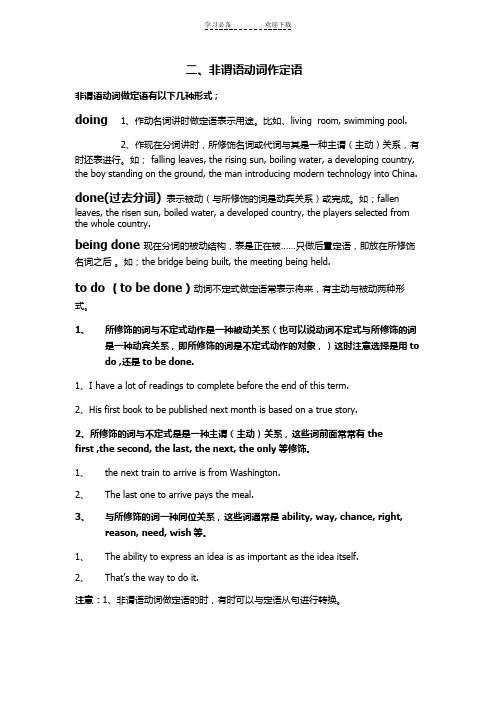
二、非谓语动词作定语非谓语动词做定语有以下几种形式;doing 1、作动名词讲时做定语表示用途。
比如、living room, swimming pool.2、作现在分词讲时,所修饰名词或代词与其是一种主谓(主动)关系,有时还表进行。
如; falling leaves, the rising sun, boiling water, a developing country, the boy standing on the ground, the man introducing modern technology into China.done(过去分词)表示被动(与所修饰的词是动宾关系)或完成。
如;fallen leaves, the risen sun, boiled water, a developed country, the players selected fromthe whole country.being done 现在分词的被动结构,表是正在被……只做后置定语,即放在所修饰名词之后。
如;the bridge being built, the meeting being held.to do (to be done)动词不定式做定语常表示将来,有主动与被动两种形式。
1、所修饰的词与不定式动作是一种被动关系(也可以说动词不定式与所修饰的词是一种动宾关系,即所修饰的词是不定式动作的对象,)这时注意选择是用to do ,还是to be done.1、I have a lot of readings to complete before the end of this term.2、His first book to be published next month is based on a true story.2、所修饰的词与不定式是是一种主谓(主动)关系,这些词前面常常有 thefirst ,the second, the last, the next, the only等修饰。
非谓语动词作定语的用法

2、不及物动词的分词作定语: doing(表示正在进行)done(表示已经完成) 例如: boiling water 正在沸腾的水 boiled water 烧开了的水 例如: developing countries 发展中国家 developed countries 发达国家
非谓语动词作定语的用法
2.In some language ,100 words make up half of all words ___D__ in daily conversations. A using. B to use. C having used. D used
非谓语动词作定语的用法
语动词之间的被动关系;若为主动,则可选择doing ,to do ; 若为被动 ,则可选择性to be done ,being done, done
3,分析时间究竟是过去,现在还是将来; 4,考虑不定式作定语的几种情况.
非谓语动词作定语的用法
1 The room is empty except for a bookshelf _A____ in some
非谓语动词作定语的用法
(三)不定式 to be done, 现在分词being done 和过去分
词done作定语的区别
例如 1The question to be discussed tomorrow is very important .
非谓语作定语和定语从句的区别
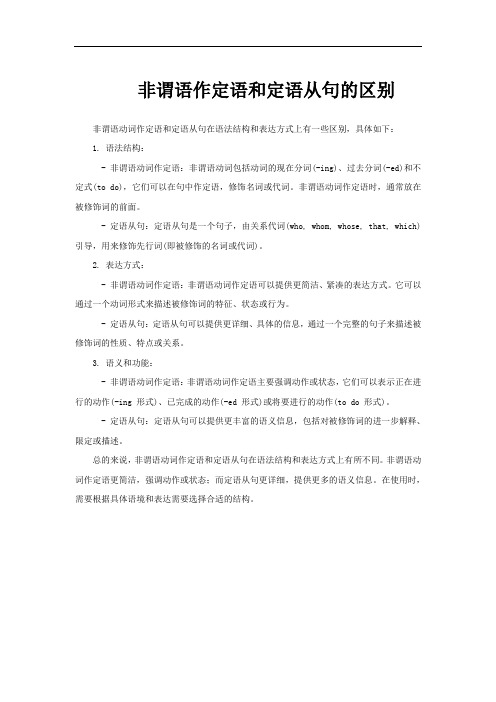
非谓语作定语和定语从句的区别
非谓语动词作定语和定语从句在语法结构和表达方式上有一些区别,具体如下:
1. 语法结构:
- 非谓语动词作定语:非谓语动词包括动词的现在分词(-ing)、过去分词(-ed)和不定式(to do),它们可以在句中作定语,修饰名词或代词。
非谓语动词作定语时,通常放在被修饰词的前面。
- 定语从句:定语从句是一个句子,由关系代词(who, whom, whose, that, which)引导,用来修饰先行词(即被修饰的名词或代词)。
2. 表达方式:
- 非谓语动词作定语:非谓语动词作定语可以提供更简洁、紧凑的表达方式。
它可以通过一个动词形式来描述被修饰词的特征、状态或行为。
- 定语从句:定语从句可以提供更详细、具体的信息,通过一个完整的句子来描述被修饰词的性质、特点或关系。
3. 语义和功能:
- 非谓语动词作定语:非谓语动词作定语主要强调动作或状态,它们可以表示正在进行的动作(-ing 形式)、已完成的动作(-ed 形式)或将要进行的动作(to do 形式)。
- 定语从句:定语从句可以提供更丰富的语义信息,包括对被修饰词的进一步解释、限定或描述。
总的来说,非谓语动词作定语和定语从句在语法结构和表达方式上有所不同。
非谓语动词作定语更简洁,强调动作或状态;而定语从句更详细,提供更多的语义信息。
在使用时,需要根据具体语境和表达需要选择合适的结构。
高中英语知识点归纳非谓语动词作定语
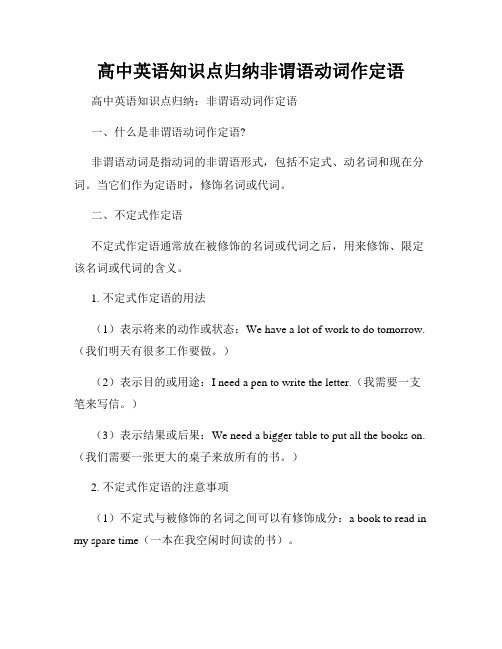
高中英语知识点归纳非谓语动词作定语高中英语知识点归纳:非谓语动词作定语一、什么是非谓语动词作定语?非谓语动词是指动词的非谓语形式,包括不定式、动名词和现在分词。
当它们作为定语时,修饰名词或代词。
二、不定式作定语不定式作定语通常放在被修饰的名词或代词之后,用来修饰、限定该名词或代词的含义。
1. 不定式作定语的用法(1)表示将来的动作或状态:We have a lot of work to do tomorrow.(我们明天有很多工作要做。
)(2)表示目的或用途:I need a pen to write the letter.(我需要一支笔来写信。
)(3)表示结果或后果:We need a bigger table to put all the books on.(我们需要一张更大的桌子来放所有的书。
)2. 不定式作定语的注意事项(1)不定式与被修饰的名词之间可以有修饰成分:a book to read in my spare time(一本在我空闲时间读的书)。
(2)不定式可以有自己的宾语:a movie to watch(一部可以看的电影)。
三、动名词作定语动名词作定语通常放在被修饰名词之前,用来修饰、限定该名词的含义。
1. 动名词作定语的用法(1)表示被修饰名词的用途或用途:a writing desk(写字台)(2)表示被修饰名词的特征、特点:a running horse(奔跑的马)2. 动名词作定语的注意事项(1)有时动名词前面会加定冠词the:the rising sun(升起的太阳)(2)动名词可以有自己的宾语:a painting depicting nature(描绘自然的画作)四、现在分词作定语现在分词作定语通常放在被修饰名词之前,用来修饰、限定该名词的含义。
1. 现在分词作定语的用法(1)表示被修饰名词的原因:a crying baby(哭泣的婴儿)(2)表示被修饰名词的特征、状态:a falling star(坠落的星星)2. 现在分词作定语的注意事项(1)有时现在分词前面会加定冠词the:the shining moon(闪耀的月亮)(2)现在分词可以有自己的宾语:a smiling girl(微笑的女孩)五、对比不同非谓语动词作定语不定式、动名词和现在分词都可以作为定语,但它们的用法和表达的含义有所不同。
非谓语动词做定语
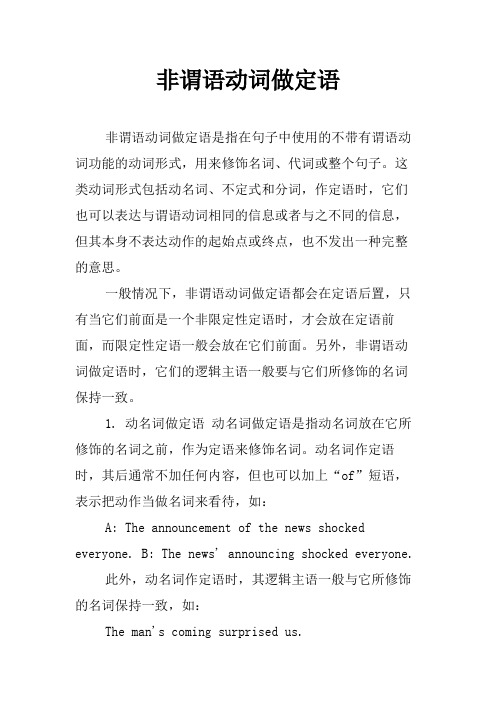
非谓语动词做定语非谓语动词做定语是指在句子中使用的不带有谓语动词功能的动词形式,用来修饰名词、代词或整个句子。
这类动词形式包括动名词、不定式和分词,作定语时,它们也可以表达与谓语动词相同的信息或者与之不同的信息,但其本身不表达动作的起始点或终点,也不发出一种完整的意思。
一般情况下,非谓语动词做定语都会在定语后置,只有当它们前面是一个非限定性定语时,才会放在定语前面,而限定性定语一般会放在它们前面。
另外,非谓语动词做定语时,它们的逻辑主语一般要与它们所修饰的名词保持一致。
1. 动名词做定语动名词做定语是指动名词放在它所修饰的名词之前,作为定语来修饰名词。
动名词作定语时,其后通常不加任何内容,但也可以加上“of”短语,表示把动作当做名词来看待,如:A: The announcement of the news shocked everyone. B: The news' announcing shocked everyone.此外,动名词作定语时,其逻辑主语一般与它所修饰的名词保持一致,如:The man's coming surprised us.2. 不定式做定语不定式做定语是指不定式放在它所修饰的名词之前,作为定语来修饰名词。
不定式作定语时,其后通常不加任何内容,但也可以加上“for”短语,表示不定式本身也是一种具体的动作,如:A: He was chosen to be the leader. B: He was chosen for leading the group.此外,不定式作定语时,其逻辑主语一般与它所修饰的名词保持一致,如:The dog's barking annoyed me.3. 分词做定语分词做定语是指分词放在它所修饰的名词之前,作为定语来修饰名词,这类分词包括现在分词和过去分词。
分词作定语时,其后可加上“-ing”、“-ed”或“-en”短语,表示分词本身也是一种具体的动作,如:A: The broken vase was thrown away. B: The vase broken was thrown away.此外,分词作定语时,其逻辑主语一般与它所修饰的名词保持一致,如:The girl singing on stage attracted manypeople's attention.总的来说,非谓语动词做定语时,可以用来表达与谓语动词相同的信息或者与之不同的信息,但其本身不表达动作的起始点或终点,也不发出一种完整的意思。
非谓语动词作定语语法讲义

非谓语动词作定语语法讲义非谓语动词作定语语法讲义一.如何判断非谓语动词作的是定语:1.看横线所在的位置具体方法如下:如果横线放在了名词或名词+逗号之后,则作的是定语。
如:The meeting________ yesterday was very important.The university, ________ in 1902, has a history of a century.2.翻译:翻译时先把句子的主干部分找出来,然后看剩下的部分是不是放在了名词之后,并且能够放在名词之前加“的”翻译,如果是,则作的是定语。
如:The meeting________ yesterday was very important.The university, ________ in 1902, has a history of a century.二.作定语时的逻辑主语:作定语时,逻辑主语就是所修饰的名词。
如:The meeting held yesterday was very important.三.如何确定用什么样的非谓语动词作定语:1.和逻辑主语之间的主被动关系2. 时间关系:将要发生、正在发生、已经完成如:1)The repairs cost a lot, but it’s money well ______.A. to spendB. spentC. being spentD. spending2)The wild flowers looked like a soft orange blanket__________ the desert.A. coveringB. coveredC. coverD. to cover3)— The last one __________________ pays the meal.— Agreed! (2007全国卷I)A. arrivedB. arrivesC. to arriveD. arriving四.作定语的具体用法:1. 能作定语的不定式和分词有:to do, to be done, doing, being done, done(务必牢记).注:having done 绝对不能作定语。
非谓语动词作定语和宾语补足语
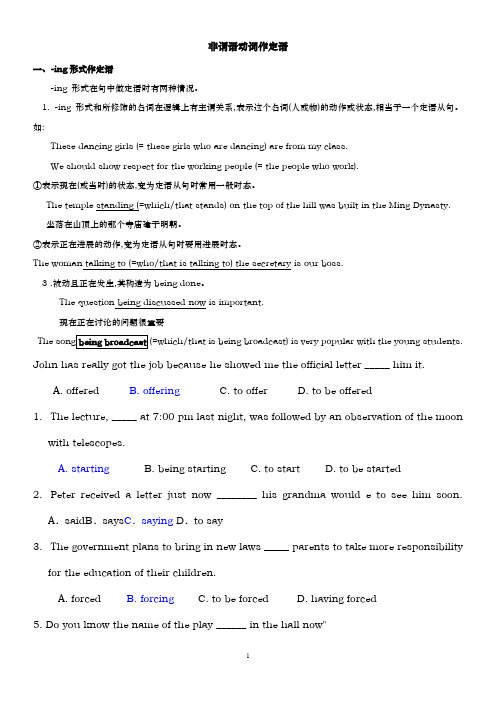
非谓语动词作定语一、-ing形式作定语-ing 形式在句中做定语时有两种情况。
1. -ing 形式和所修饰的名词在逻辑上有主谓关系,表示这个名词(人或物)的动作或状态,相当于一个定语从句。
如:These dancing girls (= these girls who are dancing) are from my class.We should show respect for the working people (= the people who work).①表示现在(或当时)的状态,变为定语从句时常用一般时态。
The temple standing (=which/that stands) on the top of the hill was built in the Ming Dynasty.坐落在山顶上的那个寺庙建于明朝。
②表示正在进展的动作,变为定语从句时要用进展时态。
The woman talking to (=who/that is talking to) the secretary is our boss.3 .被动且正在发生,其构造为being done。
The question being discussed now is important.现在正在讨论的问题很重要John has really got the job because he showed me the official letter _____ him it.A. offeredB. offeringC. to offerD. to be offered1.The lecture, _____ at 7:00 pm last night, was followed by an observation of the moonwith telescopes.A. startingB. being startingC. to startD. to be started2.Peter received a letter just now ________ his grandma would e to see him soon.A.saidB.says C.saying D.to say3.The government plans to bring in new laws _____ parents to take more responsibilityfor the education of their children.A. forcedB. forcingC. to be forcedD. having forced5. Do you know the name of the play ______ in the hall now"A. to be put onB. being put onC. put onD. putting on二、过去分词作定语1.过去分词所表示的动作在谓语动词所表示的动作之前发生,并且表被动。
非谓语动词作定语
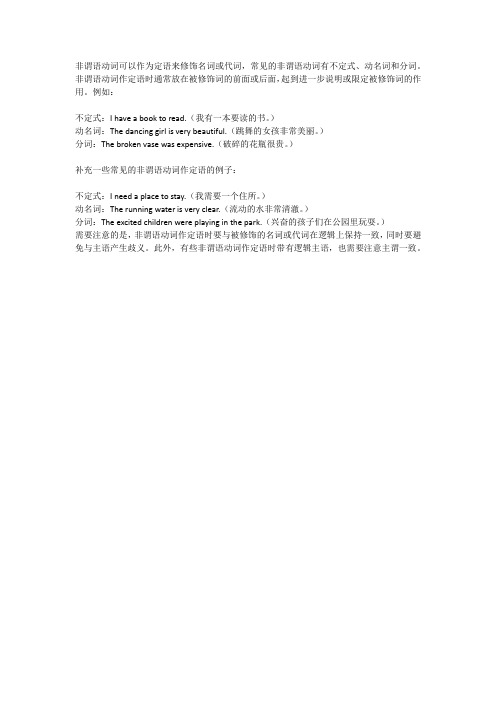
非谓语动词可以作为定语来修饰名词或代词,常见的非谓语动词有不定式、动名词和分词。
非谓语动词作定语时通常放在被修饰词的前面或后面,起到进一步说明或限定被修饰词的作用。
例如:
不定式:I have a book to read.(我有一本要读的书。
)
动名词:The dancing girl is very beautiful.(跳舞的女孩非常美丽。
)
分词:The broken vase was expensive.(破碎的花瓶很贵。
)
补充一些常见的非谓语动词作定语的例子:
不定式:I need a place to stay.(我需要一个住所。
)
动名词:The running water is very clear.(流动的水非常清澈。
)
分词:The excited children were playing in the park.(兴奋的孩子们在公园里玩耍。
)
需要注意的是,非谓语动词作定语时要与被修饰的名词或代词在逻辑上保持一致,同时要避免与主语产生歧义。
此外,有些非谓语动词作定语时带有逻辑主语,也需要注意主谓一致。
非谓语动词作定语和宾语补足语归纳
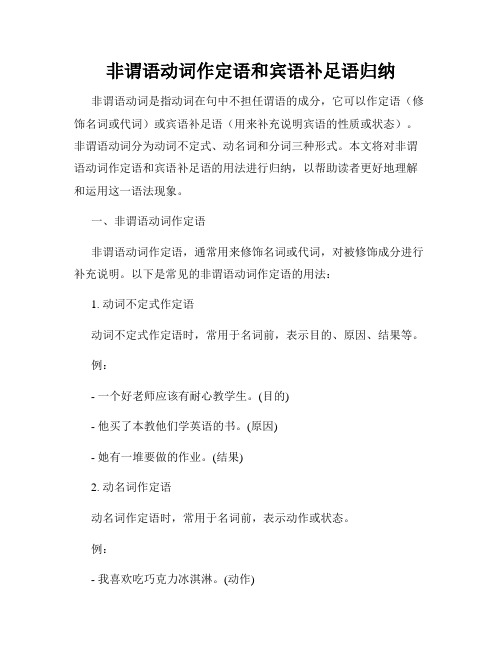
非谓语动词作定语和宾语补足语归纳非谓语动词是指动词在句中不担任谓语的成分,它可以作定语(修饰名词或代词)或宾语补足语(用来补充说明宾语的性质或状态)。
非谓语动词分为动词不定式、动名词和分词三种形式。
本文将对非谓语动词作定语和宾语补足语的用法进行归纳,以帮助读者更好地理解和运用这一语法现象。
一、非谓语动词作定语非谓语动词作定语,通常用来修饰名词或代词,对被修饰成分进行补充说明。
以下是常见的非谓语动词作定语的用法:1. 动词不定式作定语动词不定式作定语时,常用于名词前,表示目的、原因、结果等。
例:- 一个好老师应该有耐心教学生。
(目的)- 他买了本教他们学英语的书。
(原因)- 她有一堆要做的作业。
(结果)2. 动名词作定语动名词作定语时,常用于名词前,表示动作或状态。
例:- 我喜欢吃巧克力冰淇淋。
(动作)- 我们正在进行一场环保活动。
(状态)- 这是一种减压的方法。
(状态)3. 分词作定语分词作定语时,通常有现在分词和过去分词两种形式,用于形容名词的特定状态或特征。
例:- 她穿着一件红色的连衣裙。
(现在分词形容名词的状态)- 这个破旧的建筑物即将被拆除。
(过去分词形容名词的特征)- 孩子们对教室里展示的画作非常感兴趣。
(过去分词形容名词的状态)二、非谓语动词作宾语补足语非谓语动词作宾语补足语,用来补充说明宾语的性质或状态。
以下是常见的非谓语动词作宾语补足语的用法:1. 动词不定式作宾语补足语动词不定式作宾语补足语时,通常用在宾语之后,表示目的、结果等。
例:- 她让儿子吃苹果,以增强他的免疫力。
(目的)- 我听到他打开了门。
(结果)- 他把座位调整得更适合工作。
(结果)2. 动名词作宾语补足语动名词作宾语补足语时,通常用在宾语之后,表示动作或状态。
例:- 我喜欢看电影。
(动作)- 她懂得如何解决这个问题。
(动作)- 我不能忍受他对我说谎。
(状态)3. 分词作宾语补足语分词作宾语补足语时,通常有现在分词和过去分词两种形式,用于形容宾语的特定状态或特征。
非谓语动词作定语
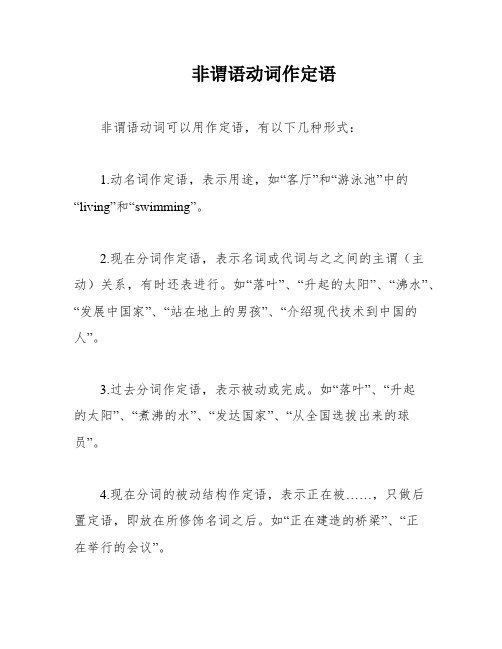
非谓语动词作定语非谓语动词可以用作定语,有以下几种形式:1.动名词作定语,表示用途,如“客厅”和“游泳池”中的“living”和“swimming”。
2.现在分词作定语,表示名词或代词与之之间的主谓(主动)关系,有时还表进行。
如“落叶”、“升起的太阳”、“沸水”、“发展中国家”、“站在地上的男孩”、“介绍现代技术到中国的人”。
3.过去分词作定语,表示被动或完成。
如“落叶”、“升起的太阳”、“煮沸的水”、“发达国家”、“从全国选拔出来的球员”。
4.现在分词的被动结构作定语,表示正在被……,只做后置定语,即放在所修饰名词之后。
如“正在建造的桥梁”、“正在举行的会议”。
5.动词不定式作定语,常表示将来,有主动和被动两种形式。
所修饰的词与不定式动作是一种被动关系时,用“to be done”;与不定式是一种主谓(主动)关系时,常常有修饰词。
如“下一班火车是从XXX来的”、“最后一个到达的人付餐费”。
XXX to express an idea is just as crucial as the idea itself。
This is the proper way to do it.Note: Non-finite verbs XXX-finite verbs used as attributive modifiers do not have the structures "having done," "having been done," or "to have done." "Having done" and "having been done" can n as adverbials (remember their usage)。
while "to have done" can sometimes serve as an object。
非谓语动词作定语讲解
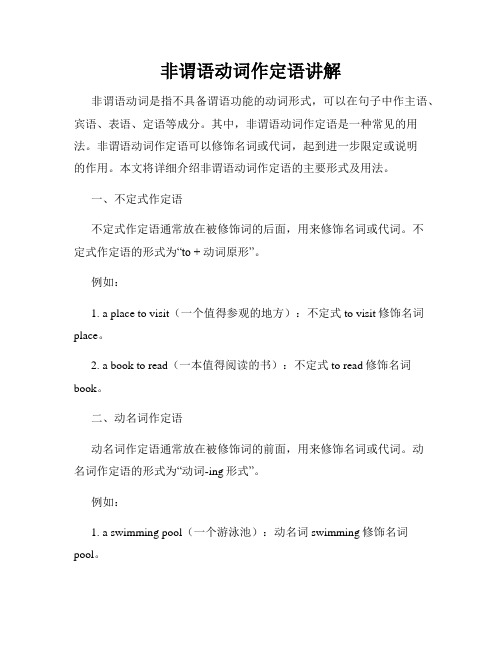
非谓语动词作定语讲解非谓语动词是指不具备谓语功能的动词形式,可以在句子中作主语、宾语、表语、定语等成分。
其中,非谓语动词作定语是一种常见的用法。
非谓语动词作定语可以修饰名词或代词,起到进一步限定或说明的作用。
本文将详细介绍非谓语动词作定语的主要形式及用法。
一、不定式作定语不定式作定语通常放在被修饰词的后面,用来修饰名词或代词。
不定式作定语的形式为“to + 动词原形”。
例如:1. a place to visit(一个值得参观的地方):不定式to visit修饰名词place。
2. a book to read(一本值得阅读的书):不定式to read修饰名词book。
二、动名词作定语动名词作定语通常放在被修饰词的前面,用来修饰名词或代词。
动名词作定语的形式为“动词-ing形式”。
例如:1. a swimming pool(一个游泳池):动名词swimming修饰名词pool。
2. a running track(一条跑道):动名词running修饰名词track。
三、过去分词作定语过去分词作定语通常放在被修饰词的前面或后面,用来修饰名词或代词。
过去分词作定语的形式为“动词过去分词形式”。
例如:1. a broken window(一扇破碎的窗户):过去分词broken修饰名词window。
2. a written report(一份书面报告):过去分词written修饰名词report。
四、形容词作定语形容词作定语通常放在被修饰词的前面,用来修饰名词或代词。
形容词作定语的形式为形容词本身。
例如:1. a blue sky(一个蓝天):形容词blue修饰名词sky。
2. a tall building(一座高楼):形容词tall修饰名词building。
五、现在分词作定语现在分词作定语通常放在被修饰词的前面或后面,用来修饰名词或代词。
现在分词作定语的形式为“动词-ing形式”。
例如:1. a singing bird(一只唱歌的鸟):现在分词singing修饰名词bird。
非谓语动词作定语的用法总结
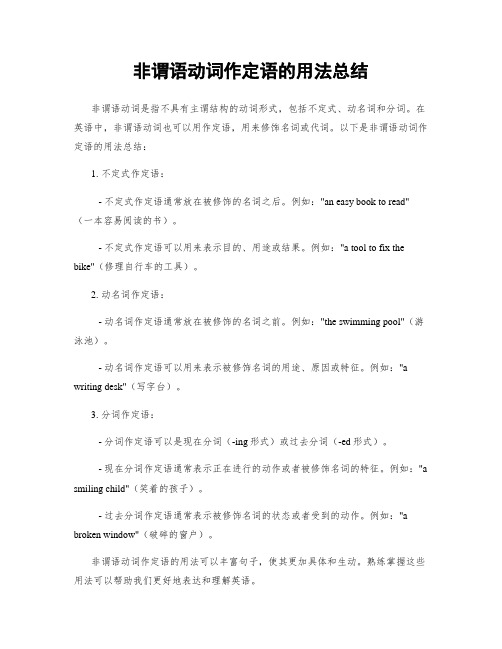
非谓语动词作定语的用法总结
非谓语动词是指不具有主谓结构的动词形式,包括不定式、动名词和分词。
在英语中,非谓语动词也可以用作定语,用来修饰名词或代词。
以下是非谓语动词作定语的用法总结:
1. 不定式作定语:
- 不定式作定语通常放在被修饰的名词之后。
例如:"an easy book to read"(一本容易阅读的书)。
- 不定式作定语可以用来表示目的、用途或结果。
例如:"a tool to fix the bike"(修理自行车的工具)。
2. 动名词作定语:
- 动名词作定语通常放在被修饰的名词之前。
例如:"the swimming pool"(游泳池)。
- 动名词作定语可以用来表示被修饰名词的用途、原因或特征。
例如:"a writing desk"(写字台)。
3. 分词作定语:
- 分词作定语可以是现在分词(-ing形式)或过去分词(-ed形式)。
- 现在分词作定语通常表示正在进行的动作或者被修饰名词的特征。
例如:"a smiling child"(笑着的孩子)。
- 过去分词作定语通常表示被修饰名词的状态或者受到的动作。
例如:"a broken window"(破碎的窗户)。
非谓语动词作定语的用法可以丰富句子,使其更加具体和生动。
熟练掌握这些用法可以帮助我们更好地表达和理解英语。
非谓语动词 作定语

将要被建成的图书馆能容纳2000人. The library to be built can hold 2000 people.
语法填空-ed和-ing前的be动词 1. The house w_a_s_b_o_u_gh_t (buy) 3 years
21. Having eaten 22. to take 23. offering 31. Basing 24. having set 32. leaving 25. bathing 33. Having been asked 26. To stay 27. Founded 28. to watch 29. asked 30. Used
3.-ed分词作定语
The building _b_u_i_lt___ last year is our teaching building. (build) The building t_o_b_e__bu_i_lt next year is our teaching building. The building b_e_in_g__b_u_iltat present is our teaching
• falling leaves 1. -ed 作定语 (动作 • fallen leaves 已完成)
2、look/expression/voice
an exciting voice an excited voice
a puzzling expression a puzzled expression
1. following 2. sliding 3. comparing 4. leaving 5. Amazed 6. making 7. Judging 8. making 9. Taken
非谓语动词做定语满分

非谓语动词做定语满分
非谓语动词作定语时,其逻辑主语是被其修饰的名词。
具体用法如下:
- 动名词作定语,只放在名词前,说明该名词的性能或用途,不表动作,被修饰的名词与-ing形式在逻辑上没有主谓关系。
如:The doctor told me not to take sleeping pills. 医生叫我不要服安眠药。
- 现在分词作定语,单个的放在所修饰的名词前(left等除外),短语放在所修饰的名词后。
现在分词表示其动作正在发生或与谓语同时发生,过去分词表示其动作已经完成或没有时间性;在逻辑上被修饰的名词与现在分词是主谓关系,与过去分词是被动关系。
如:She is a trained nurse. 她是一个受过训练的护士。
- 不定式作定语,要放在它所修饰的名词之后,表示一个将来的动作。
如:They have three tickets to spare. 他们多三张票。
- being done, done 均可用作定语,且都表示被动意义,其区别在于:to be done 表示将来,being done 表示目前正在发生,done 表示过去已经发生。
如:The house to be built next year is a cinema. 明年建的那座房子是家电影院。
在使用非谓语动词作定语时,需要注意不同形式的用法和区别,以确保表达的准确性。
- 1、下载文档前请自行甄别文档内容的完整性,平台不提供额外的编辑、内容补充、找答案等附加服务。
- 2、"仅部分预览"的文档,不可在线预览部分如存在完整性等问题,可反馈申请退款(可完整预览的文档不适用该条件!)。
- 3、如文档侵犯您的权益,请联系客服反馈,我们会尽快为您处理(人工客服工作时间:9:00-18:30)。
3.-ed分词作定语
The building _b_u_i_lt___ last year is our teaching building. (build) The building t_o_b_e__bu_i_lt next year is our teaching building. The building b_e_in_g__b_u_iltat present is our teaching
1.He was the best man __to__d_o___ the job.(do)
2.Jim is always the first student t_o__c_o_m_eto the classroom. (come)
3.中心词前有序数词,形容词最高级 或no,all,any修饰,且动词与中心 词是主动关系,用to do 做定语
5.A great number of houses w__er_e__d_e_stroyed (destroy) by the earthquake. 6.The university __f_ou_n_d_e_d_ (found) over 100 years ago has turned out lots of excellent students. 7.The boy _li_s_te_n_i_ng_ (listen)to the music wrote a song himself last year. 8. The first textbooks__w_r_it_te_n_____ (write) for teaching English as a foreign language, were produced in the 16th century.
at the meeting is very important.
2.动词不定式为不及物动词时, 其后须加上适当的介词。
1. 我正在找一间房子住。 I am looking for a room to live in. 2. 我需要用一张写字用的纸。 I need a piece of paper to write on. 3. 没什么可担心的。 There is nothing to worry about.
ago. 主语 谓语动词 2. We are decorating the house
_b_ou_g_h_t __ (buy) 3 years ago.
非谓语动词
3. Look! The girl i_s _s_ta_n_d_in_g (stand) beside the street lamp.
4. The girl _st_a_n_di_n_g___ (stand) beside the street lamp is my cousin.
1.Do you have the ability_to__r_e_a_d_ in English?
(read) 2.His attempt_to__im_p_r_o_v_e his relationship with
his classmates succeeded. (improve)
4. 被修饰的词是抽象名词时用不 定式做定语,常见的有: ability, chance, idea, hope, wish, fact, excuse, promise, attempt, way等
总结: v-ing表示 “令人……” v-ed表示“某人自己因为…感到,对…感到……”
类似表达还有:
surprised/surprising shocked/shocking amazed/amazing astonished/astonishing interested/interesting depressed/depressing pleased/pleasing satisfied/satisfying bored/boring frightened/frightening embarrassed/embarrassing disappointed/disappointing encouraged/encouraging
building. 总结: 1.动词和所修饰名词之间是被动关系,有三种形式 done/to be done/being done
2.区别是:表达事情发生的时间不同
去年被建成的图书馆由他爸爸设计. The library built last year was designed by my father.
• falling leaves 1. -ed 作定语 (动作 • fallen leaves 已完成)
2、look/expression/voice
an exciting voice an exciห้องสมุดไป่ตู้ed voice
a puzzling expression a puzzled expression
非谓语动词作定语
非谓语动词作定语
什么是定语? 修饰名词或代词的成分。
可放在名词或代词前,叫前置定语。 放在名词或代词后,叫后置定语。
1.动词不定式to do作定语,常表示 将来的动作。
1. We need some students _t_o_h_e_l_p_ 2. (Thheelpq)uweisthtiowno_rtk_o._b_e__d_i_s_c_us(dseisdcuss)
现在正在被建的图书馆下个月就要被完工了. The library being built now will be completed next month.
将要被建成的图书馆能容纳2000人. The library to be built can hold 2000 people.
语法填空-ed和-ing前的be动词 1. The house w_a_s_b_o_u_gh_t (buy) 3 years
The ability_t_o_e_x_p_r_e_s_s_ (express) an idea is as important as the idea itself.
二、分词作定语
• a developing country • a developed country
• boiling water 1. -ing作定语(动作 • boiled water 正在进行)
